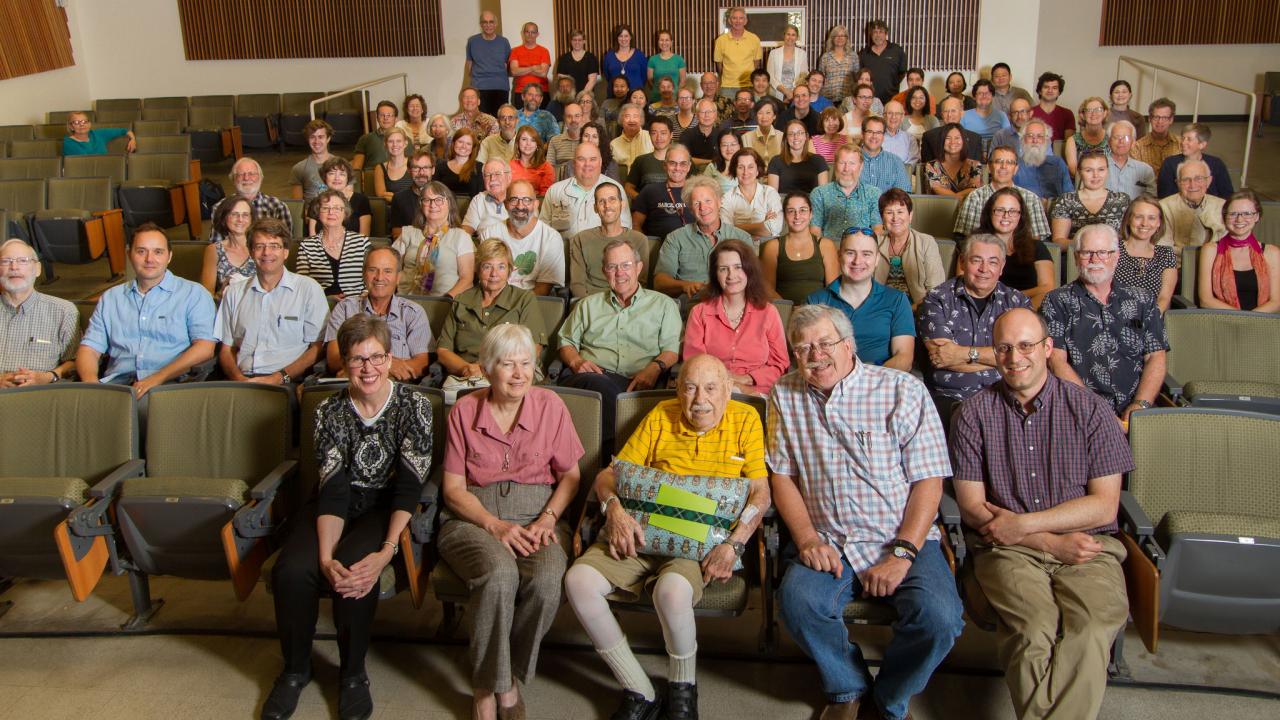
Long-Lived: Remembering Melvin Green, A UC Davis Genetics Pioneer
Melvin M. Green, distinguished professor emeritus of molecular and cellular biology, was a geneticist and member of the National Academy of Sciences. Green co-founded the historic UC Davis Genetics Department (now part of the Department of Molecular and Cellular Biology).
Green made numerous contributions to the field of genetics, demonstrating that x-rays can produce reverse mutations, documenting transposable elements in fly genomes, uncovering the genetic origin of attached X chromosomes and conducting fine structure mapping, in addition to other discoveries.
He dedicated most of his long life to science and education. In addition to his quick wit, humor and candor, Green was well-known for pioneering genetics research at UC Davis and mentoring generations of students and faculty members.
He passed away on Tuesday, Oct. 24, 2017, at the age of 101.

Honoring the Green family’s memory
Green’s family requests that memorial gifts be made to the Kathleen C. Green Scholarship in Biology, named in honor of Green’s late wife, who was a biologist. The scholarship is awarded to a biology student with outstanding scholastic achievement.
Gifts may be submitted online at https://give.ucdavis.edu/Go/MelGreen, with checks made payable to the UC Davis Foundation and sent to The Kathleen C. Green Scholarship in Biology, UC Davis, Development and Alumni Relations – Advancement Services, 202 Cousteau Place, Suite 185, Davis, CA 95618.
The UC Davis years
Green came to UC Davis in 1950, as the second professor hired in the Genetics Department under the leadership of Ledyard Stebbins. During his first year, Green made an annual salary of $5,000, performing genetics research and teaching Genetics 100 on the growing campus. He went on to teach courses in general genetics, cytogenetics, human genetics and the history of genetics.

“Green and Stebbins helped establish UC Davis as a premier research institution in genetics,” said Distinguished Professor of Genetics Michael Turelli.
“Mel often noted proudly that during the early years, in addition to growing the department, he was also personally teaching genetics to a significant fraction of the entire student body of UC Davis,” said Ken Burtis, faculty advisor to the chancellor and provost and past dean of the College of Biological Sciences.
Burtis, who once shared an office with Green, said that although Green "studiously avoided getting entangled in
administrative leadership duties, he nonetheless had a large impact in setting the standards for faculty hiring and the curriculum."
“Mel was a central figure in the culture of the old Genetics Department,” said Turelli, who met Green in 1976 when he interviewed for a position with UC Davis. “I loved his enthusiasm about science and his willingness to let a mathematician learn to do experimental work in his lab.”
In approaching his research philosophy, Green said he looked to a quote from William Bateson, who coined the word “genetics.”
“Treasure your exceptions!” Bateson wrote. “When there are none, the work gets so dull that no one cares to carry it further. Keep them always uncovered and in sight.”

Green’s genetics legacy
Green was well-known for his love of the workbench, where he spent hours experimenting with his flies. His pioneering research showed that “the concept of the gene as a single, functional, mutational and recombination unit is an oversimplification,” according to the University of California’s University Bulletin.
Green received many accolades, including two John Simon Guggenheim Fellowships, and was a visiting scholar at Leiden University in the Netherlands, the Max Planck Institute in Germany and the University of Geneva in Switzerland. In 1972, he received an honorary doctorate from the University of Umea in Sweden. Green was elected to the National Academy of Sciences in 1980.
Though he retired in 1982, Green continued visiting his lab until 2010. According to Burtis, who for many years sorted flies at the bench adjacent to Green’s, his retirement marked the end of his formal teaching, but by no means the end of his interactions with students.
“Not a single student went through my lab, or that of my other Drosophila research colleagues, who did not receive some advice about science, as well as about politics and any other issue of the day from Mel,” said Burtis.
“He was a valued mentor to many of them and even published scientific papers with some. Mel never retired from his interests in science and students.”
